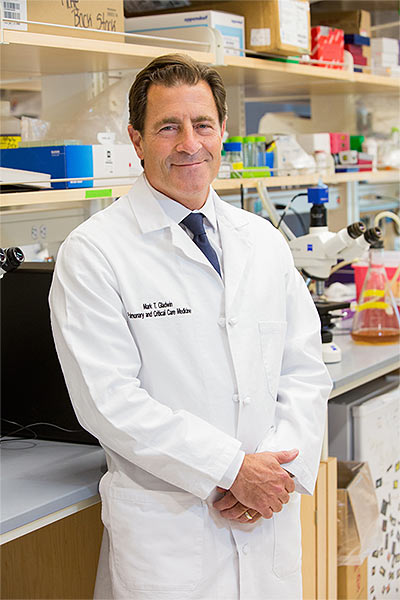 Dr. Gladwin is a physician-scientist with a specialization in vascular, heart, and lung research. His work is focused on translational biochemistry and vascular biology, with a particular emphasis on nitrite and nitric oxide-hemoglobin interactions. With an active federally funded research laboratory, Dr. Gladwin is engaged in studies and clinical trials centered around nitric oxide, nitrite, and vascular biology.
Dr. Gladwin is a physician-scientist with a specialization in vascular, heart, and lung research. His work is focused on translational biochemistry and vascular biology, with a particular emphasis on nitrite and nitric oxide-hemoglobin interactions. With an active federally funded research laboratory, Dr. Gladwin is engaged in studies and clinical trials centered around nitric oxide, nitrite, and vascular biology.
One of Dr. Gladwin's notable scientific contributions is the identification of nitrite salt as a biological signaling molecule that governs physiological and pathological responses to hypoxia, blood pressure and flow regulation, and dynamic mitochondrial electron transport. He has also made significant advancements in understanding how hemoglobin and myoglobin function as nitrite reductases, playing a crucial role in nitric oxide production during hypoxia. His seminal publication in 2003 on this subject has garnered over 2000 citations and is recognized as a top ten Classic Collection by Nature Medicine. Importantly, this research has paved the way for the development and licensing of intravenous, oral, and inhaled nitrite-based therapies for human use.
In addition to his work on nitrite, Dr. Gladwin has extensively studied a novel disease mechanism known as hemolysis-associated endothelial dysfunction. This groundbreaking research has identified a state of nitric oxide resistance in patients with conditions such as sickle cell disease, malaria, transfusion of aged blood, and other hemolytic disorders. This resistance is caused by the scavenging of nitric oxide by hemoglobin released into the plasma during hemolysis. Dr. Gladwin's studies have translated into clinical and epidemiological insights, leading to the recognition of a human disease syndrome called hemolysis-associated pulmonary hypertension, which is highly prevalent in individuals with sickle cell anemia.
Dr. Gladwin is currently heading a Phase II clinical trial, conducted across 22 sites in France, Brazil, and the U.S. This study aims to evaluate the effectiveness of a novel blood transfusion technique that utilizes the patient's own blood to improve outcomes and extend survival in patients with sickle cell disease. This disease notably affects the black community, reducing their average lifespan by 22 years.
In a recent breakthrough, Dr. Gladwin and his dedicated research team have successfully engineered a protein capable of reversing carbon monoxide poisoning in mice. This significant discovery holds immense potential for the development of an antidote that could save lives in cases of carbon monoxide poisoning, a leading cause of poisoning-related deaths worldwide. Annually, more than 50,000 emergency room visits in the United States alone are attributed to this deadly poisoning. Dr. Gladwin's findings open new avenues for research and may ultimately lead to the creation of the first antidote for carbon monoxide poisoning in humans.
Dr. Gladwin's contributions in the fields of vascular biology, nitric oxide, and nitrite research have had a profound impact on the medical community. His work has not only advanced our understanding of the intricate mechanisms underlying blood flow regulation and the role of reactive nitrogen molecules but has also translated into tangible therapeutic advancements. The development of intravenous, oral, and inhaled nitrite as potential therapies represents a significant milestone in the treatment of various conditions, including those related to hypoxia and hemolysis. These innovative therapeutic approaches offer promising avenues for improving patient outcomes and enhancing quality of life.

